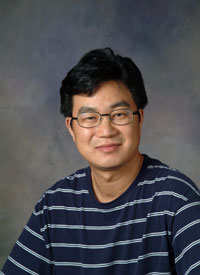Our Science – Chen Website
Xin Chen, M.D., Ph.D.
 |
|
|||||||||||||||||||||||||
Biography
Dr. Chen graduated from the Hubei College of Chinese Medicine in 1984 with a M.D. in Medicine and from the Guangzhou University of Chinese Medicine and Pharmacy in 1991 with a Ph.D. in the Canon of Internal Medicine. From 1991 to 1998, Dr. Chen was a research physician at the Shenzhen Institute of Integrative Chinese and Western Medicine, Shenzhen Red Cross Hospital. In 1998, Dr. Chen decided to change his fields of research from clinically-orientated studies to fundamental laboratory research in immunology using alternative medicines. Dr. Chen started his Post Doctoral training at the School of Pharmacy and Biomedical Sciences, University of Portsmouth, UK, under the direction of Dr. Clive Barwell. In April of 1999, Dr. Chen joined the Laboratory of Molecular Immunoregulation, National Cancer Institute-Frederick, NIH, as a Visiting Fellow. In 2001, Dr. Chen became a scientist in the Laboratory of Molecular Immunoreglation, Basic Research Program, SAIC-Frederick, NCI-Frederick.
Research
Modulation of immune response: targeting tumor and autoimmunity - studies of the effects of pharmacological agents, derived from alternative medicine system (traditional Chinese medicine) and conventional biomedical system (natural products), on the function of chemokine receptors, CD4+CD25+ T regulatory cells and dendritic cells as a means of modifying immune responses.
Identification of novel chemokine receptor antagonists from traditional Chinese medicine- Chemokine receptors comprise a family of seven transmembrane domain G protein-coupled receptors, which orchestrate immune response by directing migration of leukocytes. Recently, chemokine receptors have been shown to play an important role in the pathogenesis of some major human diseases, including HIV, cancer and inflammation. Dr. Chen has studied traditional Chinese medicine as a source of inhibitors of chemokine receptors. Starting with multiple component Chinese herbal medicines, Dr. Chen has successfully identified a number of chemically defined chemokine receptor antagonists, such as deoxycholic acid, chenodeoxycholid acid, tannic acid, and shikonin. One of Dr. Chen's on-going projects is to study anti-tumor activity of those compounds in animal models.
Pharmacological manipulation of CD4+CD25+FoxP3+ T regulatory cell (Treg) function - Tregs, which constitute 5-10% of peripheral CD4+ T cells, play a crucial role in maintenance of peripheral tolerance and suppress immune responses to alloantigens and autoantigens, including tumor antigens. Inhibition of Treg function can boost anti-tumor immune response, while up-regulation of Treg activity has been shown to inhibit autoimmunity, allergy, transplantation rejection and GVHD. Dr. Chen has reported that BALB/c mice have more Tregs and consequently showed greater susceptibility to suppression of their CD4+CD25- responder T cells than C57BL/6 mice. He observed that Tregs were relatively resistant to glucocorticoid-induced cell death and that IL-2 selectively, greatly protected Tregs from spontaneous and induced cell death. Based on this observation, he developed a combination therapy of glucocorticoid and IL-2 and found that this combination treatment markedly expanded Tregs in vivo. Treatment with glucocorticoids and IL-2 inhibited development of an autoimmune disease in mice; experimental autoimmune encephalomyelitis (EAE). Dr. Chen also found that mice induced to develop EAE were deficient in functional Treg cells. These studies by Dr. Chen led to the discovery that pertussis toxin, an adjuvant component of the immunogen used to induce EAE, was responsible for the suppressive Treg activity. Since the effect of pertussis toxin was likely to be mediated by inflammatory cytokines, Dr. Chen therefore studied the effect of pertussis toxin-elicited cytokines on Treg function and found that IL-1-beta, IL-6 and TNF-alpha were capable of abrogating the inhibitory activities of Tregs temporarily. However, Dr. Chen then found that in co-cultures of Tregs and naive CD4 cells, more prolonged exposure to TNF selectively activated and expanded Tregs. This was a sharp contrast to IL-6 which was crucial for the induction of Th17 cells (IL-17 producing cells). In on-going project, Dr. Chen is studying the effect of tumor-derived TNF on the expansion of Tregs.
Dr. Chen has studied pharmacological manipulation of dendritic antigen presenting cells (DC) using component from traditional Chinese medicine. He found that triptolide, an immunosuppressive agent from Chinese herbal medicine with anti-rheumatoid activity, potently inhibited DC maturation and trafficking. One of his on-going projects is the study of another immunosuppressive compound derived from an anti-rheumatoid Chinese herb on the generation of a tolerogenic feedback loop between tolerogenic DC and Tregs.
This page was last updated on 7/15/2008.

